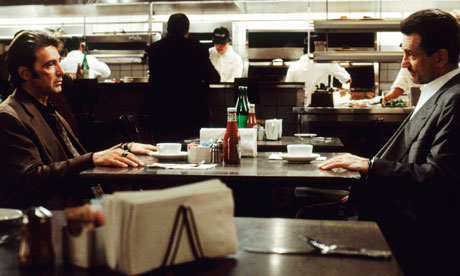Synopsis:
In 1985, an ambitious young broker, Bud Fox (Charlie Sheen), is lured into the illegal, lucrative world of corporate espionage. His downfall culminates as a result of his addiction to the seductive enticement of power, status and financial wizardry promised to him by Wall Street legend Gordon Gekko (Michael Douglas).
Review:
Janwillem Van De Weterling once said that: “greed is a fat demon with a small mouth, and whatever you feed it is never enough”. Greed is good according to Gordon Gekko. It is the template of society. Without greed, there would be no progression, no desire, no nothing.
Michael Douglas’ portrayal of Gordon Gekko is masterly. The slick and calculating financier who uses and abuses the people around him is perhaps one of the most vile and despicable characters in film history. However, for as much as the audience hates him, they can never take their eyes off of him. He controls the gaze through his manipulation and twisting of the emotional core found within the people he is trying to convince. As he notes to Bud Fox, there are no friends in the business world: “If you want a friend, buy a dog”.
Gekko’s name has clearly been inspired by the lizard that feeds off insects less powerful. Scaly and slithery, the gecko is a creature that is quite innocent from a physical perspective, but is driven by a desire to live and survive in the jungles of the land from all adversaries. Gordon Gekko is exactly the same. He is not content with merely surviving in the jungles of the business world, but rather is determined to destroy all of his competition with a vengeance. He is a greedy, self absorbed mongrel but people attach themselves to him as if they were moths to a flame. Bud Fox fits this analogy to a tee, and is definitely burned by it.
The 1980s were a decade in search of an identity. The 1960s and 1970s had been tumultuous years for America, and great change was thus needed in the 80s in order to instill some sort of defined leadership to appease society. When Ronald Reagan entered the White House in 1980, he demanded alterations in hopes of witnessing the revival of The United States of America. He pushed forward the prospect of individual freedom and the idea that the individual could accomplish anything on the strength of himself, rather than through a reliance on government institutions. In connection with this, Reagan also wanted to reinvigorate the United States economy. Driven by the idea that dreams could be accomplished through capitalistic practices, America became a self-absorbed culture of excess. Greed was good!
Bud Fox is a man driven by these very needs. A broker who frantically must sell himself to clients all day long finally begins to become disillusioned with his current status. At one point, he notes that he wonders when he will be on the other end of the line. Instead of selling, he wants to be buying. His desire is to be like Gordon Gekko. He is passionate and determined and after 40 days of constant harassment, Gekko finally agrees to see Fox. But he is in over his head from the get go. When he enters Gekko’s luxurious office (which is ten times the size of his apartment on the upper west side ofNew York), he stares in amazed wonderment. Gekko is such an imposing figure that he intimidates the young Fox. Being slightly coy with him, he demands that Bud tell him something worthwhile. He is playing and toying with him the entire time (just setting him up for the kill). That is until Fox surprises him with a tip. Gekko no longer feels the need to kill him off (figuratively) and cast him back out in the harsh world of bureaucratic business. Gekko understands that he can now use him and mold him into someone who can help him become even richer.
Fox is so enamored by the chance to alter his present situation of financial strain that he quickly becomes enveloped into the lecherous world of Gekko. Immediately, Fox begins to change both externally and internally. His suits become darker, his hair becomes slicker rather then frazzled, his ideals begin to change and arrogance begins to manifest itself from within (which has never been transparent before). In one instance, his desire to become someone has corrupted his ideals, and thus transforms him into the man Gekko wants him to be.
Oliver Stone provides an interesting sub-story at this point of the film. Fox’s father, Carl (Martin Sheen), is an honorable working class man who fixes airplanes. He is a morally centered man. He dreams that his son will make something of his life and desires the best for him. He truly cares for his son whereas Gekko merely uses him. In a sense, Carl Fox and Gordon Gekko are vying for the soul of Bud. He must choose between the ideals emphasized by the character traits of these two men. Bud’s desire has always been to become successful and rich, and he is easily manipulated by the temptation of what Gekko has to offer him. Gekko not only blackens the soul of Bud, but he also becomes a new father figure to him by lavishing gifts and women on him (which Carl never had the ability to do). Bud turns his back on his father because success has tainted him. Money has become his life; his new family (quite reminiscent of an important Biblical story involving God, Jesus, and the temptations by The Devil).
‘Wall Street’ is not a perfect film in any way. In fact, it is not one of Oliver Stone’s masterpieces. But it does capture a time period with magnificent clarity as a result of Stone’s ability to capture greed at its finest. With this being said, there are some elements that detract from the overall impact of the film. For instance, Darryl Hannah’s performance is forgettable, Sean Young’s turn as Gekko’s wife is small and unmentionable (she is barely in the film, although I assume that this is the point-the business world and personal world do not mix, and Gekko has clearly chosen the professional world as his family), the music is typical cheesy 80’s fare, and the self- reflecting dialogue by Fox is sometimes forced and illogical.
Though the story follows a familiar trajectory with rise, fall and redemption elements, there is still something truly intoxicating about the film. As we journey with Fox, we realize what he is becoming. He is no longer in control of his destiny. He has sold his soul to the devil in order to embrace superficial happiness. It is a morality tale that can speak to the likes of everyone. How much is too much? Is financial success the true meaning of happiness? Gekko is happy but he never truly lives in this film. He lives for the money and power but for nothing else. Is this the symbol of what life should be? Only you, the individual, can decide for yourself.



